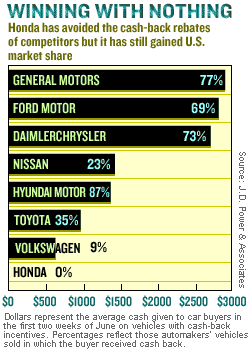NEW YORK (CNN/Money) -
Car buyers love incentives, but more and more of them love the one big automaker that doesn't offer cash back even more: Honda Motor Co.
While other major automakers offer zero-interest financing and thousands of dollars cash back to lure buyers into showrooms, Honda has been gaining market share in the United States. That's the case even though it's not offering cash back, and has only modest financing incentives available.

"Honda clearly has a very loyal owner group; they're highly satisfied, they're not going to be swayed by incentives elsewhere," said Mike Flynn, an auto expert at the University of Michigan.
Through May, Honda's (HMC: Research, Estimates) share of U.S. new vehicle sales has grown to 8.3 percent from 7.0 percent a year earlier, the biggest gain for any automaker. Its U.S. sales jumped 14 percent, making it the only major automaker with gains above 10 percent.
By contrast, General Motors Corp. (GM: Research, Estimates), the leader in pushing incentives to sell cars and trucks, has seen its sales fall about 6 percent and its market share slip to 27.3 percent from 28.1 percent in the first five months of 2002.
While Honda does offer some incentives, it doesn't offer the zero-percent financing popular at the Big Three automakers. And it isn't likely to join the incentive wars soon.
That's good news for Japan's No. 3 automaker, since the incentives have hurt profitability at the Big Three and at some Asian automakers, including Toyota Motor Corp. (TM: Research, Estimates), Nissan Motor Co. (NSANY: Research, Estimates), Mitsubishi Motors Corp. and Hyundai.
"As you can see in our sales numbers, those are selling very well without putting any incentives on it," Honda spokesman Yuzuru Matsuno said from Detroit. "There's no reason to use incentives."
One reason buyers are willing to overlook incentives at Honda: Their cars, minivans and SUVs tend to retain more of their resale value than competitors' vehicles.
"Incentives push down the resale value of a car and consumers take that into account," outgoing Honda President Hiroyuki Yoshino said in Tokyo last week, according to Reuters.
U.S. market now key for Honda
The strong resale value and perceived quality of its cars has helped make the United States more important to Honda than its home market of Japan. Honda's U.S. sales have topped Japanese sales since 1984 and today it sells about 38 percent more vehicles here than at home.
By tightly controlling production and capacity, Honda hasn't felt the pressure hitting other automakers to offer the cash back to keep cars moving and factories running.
Its five U.S. and Canadian plants are expected to produce 1.26 million vehicles this year, barely above their stated capacity of 1.25 million, which would mean that for the first time Honda will produce more vehicles at those five plants than in Japan.
"The domestic manufacturers have capacity in excess of demand, so they have determined to lower price through incentives to keep them occupied," said Tom Libby of J.D. Power & Associates. He said it is highly unlikely that the traditional Big Three -- GM, Ford Motor Co. (F: Research, Estimates) or the Chrysler Group unit of DaimlerChrysler AG (DCX: Research, Estimates) -- could follow Honda's example on incentives, even if they cut base prices by an amount equal to current cash incentives.
| Related stories
|

|
|
|
|
"Right now the domestic brands do not have the reputation that would allow them to go without incentives," Libby said. "Chrysler tried it three years ago. Then two weeks later they got right back on the incentives because without them they couldn't market anything. The brand strength of Honda, the history of reliable, durable products, is great enough to pull in prospects without customer cash."
Honda's Matsuno said another thing working for his company is its new products, such as the Pilot and Element sport/utility vehicles and the redesigned Accord sedan, that allow it to forgo incentives. It's also shown more discipline than other automakers by sticking with a no-incentive policy.
For example, in 2002, the Accord lost its spot as the best-selling U.S. car to the Toyota Camry. But Honda didn't get into an incentive war with Toyota in a bid to hang onto bragging rights.
"Our goal is to hit our own sales target. We don't much care about the relative position in the market," Matsuno said.
Gains expected to continue
Honda's U.S. shares have fallen about 4 percent during the last 12 months as the falling dollar hurt revenue. Its shares trailed the ADRs of Toyota during that time but outperformed the Big Three, all of which have dropped more than 20 percent.
Analysts say Honda will continue to make steady market share gains even without joining the incentive battle.
Click here for a look at auto stocks
"Toyota tends to have more products in each segment," Libby said. "Honda goes much slower -- for example, it's not in pickups at all. But they watch and when they execute a product, they do it almost flawlessly so they immediately have a leader in the segment."

|

